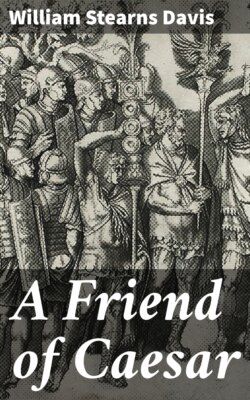Читать книгу A Friend of Caesar - William Stearns Davis - Страница 13
На сайте Литреса книга снята с продажи.
I
ОглавлениеTable of Contents
Drusus started long before daybreak on his journey to Rome; with him went Cappadox, his ever faithful body-servant, and Pausanias, the amiable and cultivated freedman who had been at his elbow ever since he had visited Athens. For a while the young master dozed in his carriage; but, as they whirled over mile after mile of the Campagna, the sun arose; then, when sleep left him, the Roman was all alive to the patriotic reminiscences each scene suggested. Yonder to the far south lay Alba, the old home of the Latins, and a little southward too was the Lake of Regillus, where tradition had it the free Romans won their first victory, and founded the greatness of the Republic. Along the line of the Anio, a few miles north, had marched Hannibal on his mad dash against Rome to save the doomed Capua. And these pictures of brave days, and many another vision like them, welled up in Drusus's mind, and the remembrance of the marble temples of the Greek cities faded from his memory; for, as he told himself, Rome was built of nobler stuff than marble;—she was built of the deeds of men strong and brave, and masters of every hostile fate. And he rejoiced that he could be a Roman, and share in his country's deathless fame, perhaps could win for her new honour,—could be consul, triumphator, and lead his applauding legions up to the temple of Capitoline Jove—another national glory added to so many.
So the vision of the great city of tall ugly tenement houses, basking on her "Seven Hills," which only on their summits showed the nobler temples or the dwellings of the great patricians, broke upon him. And it was with eyes a- sparkle with enthusiasm, and a light heart, that he reached the Porta Esquilina, left the carriage for a litter borne by four stout Syrians sent out from the house of his late uncle, and was carried soon into the hubbub of the city streets.
Everywhere was the same crowd; shopping parties were pressing in and out the stores, outrunners and foot-boys were continually colliding. Drusus's escort could barely win a slow progress for their master. Once on the Sacred Way the advance was more rapid; although even this famous street was barely twenty-two feet wide from house wall to house wall. Here was the "Lombard" or "Wall Street" of antiquity. Here were the offices of the great banking houses and syndicates that held the world in fee. Here centred those busy equites, the capitalists, whose transactions ran out even beyond the lands covered by the eagles, so that while Gaul was yet unconquered, Cicero could boast, "not a sesterce in Gaul changes hands without being entered in a Roman ledger." And here were brokers whose clients were kings, and who by their "influence" almost made peace or war, like modern Rothschilds.
Thither Drusus's litter carried him, for he knew that his first act on coming to Rome to take possession of his uncle's property should be to consult without delay his agent and financial and legal adviser, lest any loophole be left for a disappointed fortune-hunter to contest the will. The bearers put him down before the important firm of Flaccus and Sophus. Out from the open, windowless office ran the senior partner, Sextus Fulvius Flaccus, a stout, comfortable, rosy-faced old eques, who had half Rome as his financial clients, the other half in his debt. Many were his congratulations upon Drusus's manly growth, and many more upon the windfall of Vibulanus's fortune, which, as he declared, was too securely conveyed to the young man to be open to any legal attack.
But when Drusus intimated that he expected soon to invite the good man to his marriage feast, Flaccus shook his head.
"You will never get a sesterce of Cornelia's dowry," he declared. "Her uncle Lentulus Crus is head over ears in debt. Nothing can save him, unless— "
"I don't understand you," said the other.
"Well," continued Flaccus, "to be frank; unless there is nothing short of a revolution."
"Will it come to that?" demanded Drusus.
"Can't say," replied Flaccus, as if himself perplexed. "Everybody declares Caesar and Pompeius are dreadfully alienated. Pompeius is joining the Senate. Half the great men of Rome are in debt, as I have cause to know, and unless we have an overturn, with 'clean accounts' as a result, more than one noble lord is ruined. I am calling in all my loans, turning everything into cash. Credit is bad—bad. Caesar paid Curio's debts—sixty millions of sesterces.[47] That's why Curio is a Caesarian now. Oh! money is the cause of all these vile political changes! Trouble is coming! Sulla's old throat cuttings will be nothing to it! But don't marry Lentulus's niece!"
[47] I.e. $2,400,000; a sesterce was about 4 cents.
"Well," said Drusus, when the business was done, and he turned to go, "I want Cornelia, not her dowry."
"Strange fellow," muttered Flaccus, while Drusus started off in his litter. "I always consider the dowry the principal part of a marriage."
